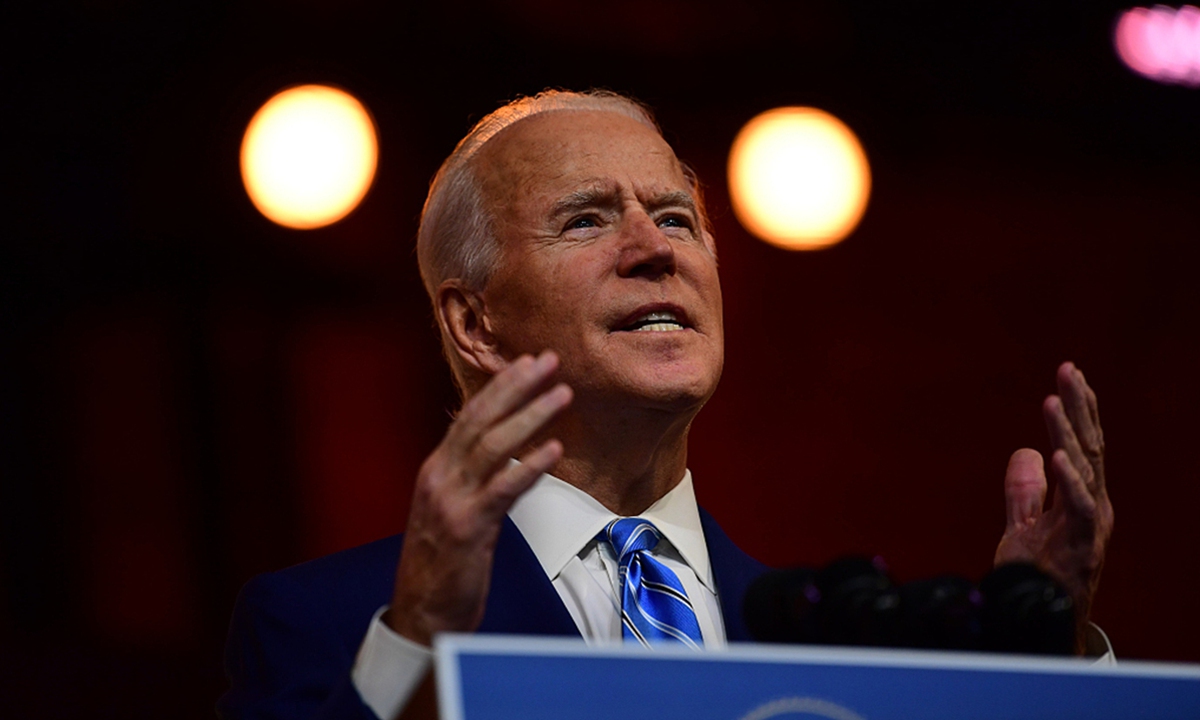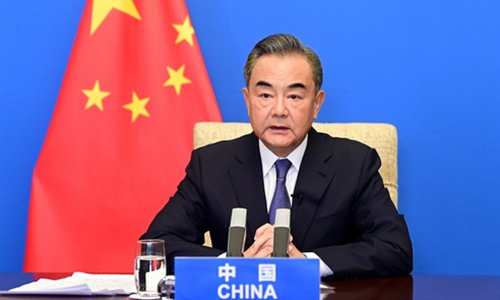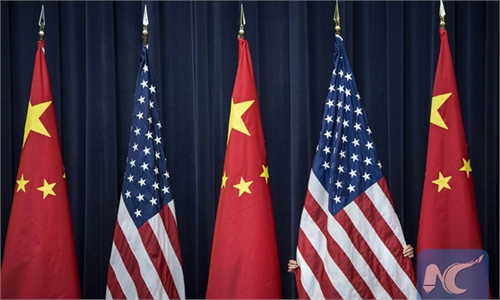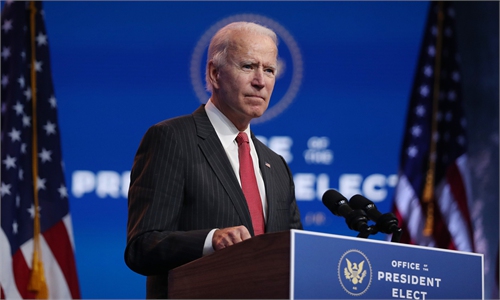Biden could break the ice on trade, economic issues: analysts
China-US dialogue may restart

Joe Biden. Photo: VCG
China and the US may restart communication in the area of trade and economics - making it one of the first sectors for the world's two largest economies to break the ice amid a downward spiral in bilateral relations - when US President-elect Joe Biden takes office, observers said, after Chinese Foreign Minister Wang Yi called on Monday for the two sides to open dialogue at all levels.
Diplomatic dialogue could also be opened under Biden's administration, with the two countries eyeing talks in the areas of politics and national security after the first window of economic communication resumes, analysts said.
Wang, who is also the Chinese State Councilor, said that China and the US should strengthen communication and dialogue.
"Any issues can be brought to the table for discussion, and the two countries can communicate on strategic, overall and long-term issues, while they also can conduct consultations on specific topics," Wang said. He made the comment during a video conference with a delegation from the US-China Business Council's board of directors in Beijing on Monday.
While stressing that China's door for dialogue has always been open, Wang suggested that the two sides could work together to formulate three lists on dialogue, communication and dispute management, to provide a clear network on clarifying, maintaining and developing bilateral relations.
Chinese observers interpreted Wang's remarks as a goodwill gesture to the incoming Biden administration, after China-US relations sank amid a trade war, the US' blatant interference over Hong Kong and Taiwan question, and its malicious crackdown on a number of Chinese tech firms including Huawei and TikTok.
"It is likely that dialogue on economic and trade issues will open first, as the areas are of mutual interest, benefit both sides and do not involve ideological conflicts," Gao Lingyun, an expert from the Chinese Academy of Social Sciences in Beijing, told the Global Times on Monday.
He added that there are certain levels of "hesitation and doubt" from Washington on how Beijing would set the tone for economic relations with the new president, and Wang's official comment also aims to allay such concerns.
Wei Jianguo, former vice minister of commerce, said at the Global Times' annual forum that China-US relations will warm up and offer more chances for cooperation in Biden's administration.
"Biden will not resort to the maximum pressure approach like incumbent US President Donald Trump. He tends to 'observe' first and take action in a rational and steady way," Wei said. But some observers also noted that there won't be a big change in the US' China policy.
Wang also said at the video conference that economic and trade cooperation serves as the cornerstone of China-US relations, and American business people are the "stabilizing force" that promotes the sound development of bilateral relations.
As Biden's new administration will involve the interests of big US conglomerates, most of which have suffered from the year-long trade war, his team could also be pressured to resume trade negotiations on a phase two trade deal, analysts pointed out.
Some 3,500 US businesses, including big corporations such as Tesla and Ford, have filed lawsuits against the Trump administration over imposed tariffs, which they claim are unlawful.
"China's stance is very clear: it is willing to sit at the table and narrow differences with the US on a phase two trade agreement," Gao said.
But he noted that talks on the phase two deal may not be held "very soon," as Biden has to first face a long list of daunting challenges, including curbing the pandemic and stimulating the economy after he is sworn in.
Biden said last week that he would not immediately remove tariffs on hundreds of billions of dollars of Chinese products. Analysts expect that both sides will continue implementing the hard-won phase one trade deal under the new US president.
In the first 11 months, China-US trade rose 6.9 percent year-on-year to 3.65 trillion yuan ($558.43 billion), extending the growth trend of the past few months, according to Chinese customs data released on Monday.
Wang Xiaosong, an economics professor at the Renmin University of China in Beijing, told the Global Times on Monday that China-US bilateral trade in 2020 is expected to reach about 80 percent of that recorded in 2017, before the trade war was launched by the US.





